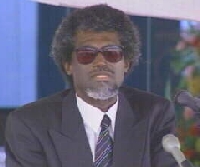|
| |
Contact:
John Emmanuel
Tuesday, October 14, 2003 - As member countries of the Eastern Caribbean
Currency Union (ECCU), continue to mark Financial Literacy Month in October,
Governor of the Eastern Caribbean Central Bank (ECCB), Sir Dwight Venner, has
been shedding light on the region’s ability to maintain a strong EC dollar.
 |
|
Sir Dwight Venner - Governor of the Eastern
Caribbean Central Bank |
In a televised address to be aired in ECCU member countries, Sir Dwight
highlighted two reasons he said were responsible for the buying rate of $EC2.7
to the $US 1 – an exchange rate that has remained constant for close to three
decades. The first reason, he stated, was the Treaty of Basseterre signed in
1981 and the second, the ECCB agreement signed two years later.
“In the ECCB agreement, full knowledge of the situation was required with
respect to the currency arrangement that they, meaning the founding fathers,
went into. They then set up what is called a ruled based system subject to the
checks and balances of a multiple-country arrangement and that has been the
fundamental reason for the stability of the currency,” said Sir Dwight.
He went on, “Legally the currency cannot be changed except by unanimous
agreement and also given the currency arrangements, it has to be highly backed
by law.” That policy the ECCB Governor explained, has benefited the region’s
economies and citizens, in that both consumers and investors have greater
confidence due to price stabilization. Prices for basic commodities within the
ECCU has remained constant for well over five years as a result, he said.
The EC Currency is generated primarily through exports which in turn produce
foreign exchange, direct investment such as large infrastructural development,
remittances from nationals working or living overseas and from foreign aid.
|